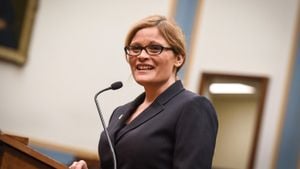On November 15, 2024, French PhD student Victor Dupont was welcomed back to Paris after weeks of uncertainty following his detention in Tunisia. His arrest, which took place on October 19, captured international attention, shining a light on the precarious situation for foreign researchers operating under increasingly strict regimes.
Dupont's academic focus was on social movements, youth unemployment, and the events surrounding Tunisia's 2011 revolution. He had traveled to the country to conduct interviews pertinent to his research when he was taken by authorities. Initially, he was among three French nationals arrested outside his apartment, with two others quickly releasing. Yet, confusion still surrounds the fate of one woman, holding dual French-Tunisian citizenship, whose status remained unclear as of Friday.
French Foreign Ministry spokesperson Christophe Lemoine confirmed Dupont's release, emphasizing the ministry's continued support throughout the ordeal. "The Ministry of Foreign Affairs, together with the Ministry of Higher Education and Research, have been closely monitoring his situation since his arrest, and even though he has now been released, they remain mobilized with the follow-ups of this case," Lemoine stated.
Reports indicated Dupont was charged with allegedly undermining national security—a claim vigorously contested by his supporters. Scholars and organizations advocating for academic freedom highlighted the arrest as indicative of broader threats to research and freedom of expression within Tunisia under President Kais Saied's administration.
Claims against Dupont asserted no link between his work and any foreign threats to Tunisia, with observers arguing his detention exemplified growing constraints on academic freedom. Yale Law School professor, and president of the Middle East Studies Association, Dr. asli Bali, insisted Dupont's engagements posed no risk to the state. "It has no connection with foreign powers or foreign affairs and presents no threat whatsoever to the security of the Tunisian state," she expressed, stressing the significant ramifications his arrest holds for future social scientific research.
The backdrop for Dupont’s arrest is troubling, as Tunisia has seen increasing restrictions on journalists, opposition figures, and activists under Saied, who has reversed many democratic gains made since the Arab Spring. This erosion of rights has led to heightened vigilance among foreign researchers who frequently encounter scrutiny during their fieldwork.
Dupont's return signals some relief, but raises pressing concerns about the general climate for academic inquiry not just within Tunisia, but throughout the region, where the safety of researchers continues to be compromised. The history of other foreign nationals facing perilous situations—such as the tragic case of Giulio Regeni, who was murdered during his research work in Egypt—serves as a constant reminder of the risks involved.
Tunisia enjoys long-standing ties with France, which remains its primary trade partner and maintains significant geopolitical interests, particularly with respect to migration management from North Africa to Europe. President Emmanuel Macron has weighed-in, reportedly discussing Dupont’s predicament with Saied directly. Despite this diplomatic intervention, the Tunisian government has yet to clarify the nature of the charges against Dupont, causing concern among advocacy groups.
This incident has revitalized discussions concerning the safety and security of international researchers operating within the Middle East and North Africa, underscoring the need for protective measures and open dialogues between governments to safeguard academic freedom. While Dupont's freedom is celebrated, it opens the door for larger conversations about the future of research and the rights of scholars working under potential threats.
The outpouring of support from Dupont’s academic community, alongside NGOs and foreign diplomatic channels, has demonstrated the importance of international advocacy for the protection of scholars. Going forward, the focus remains on ensuring the safeguarding of academic freedom to allow for unbiased research unimpeded by geopolitical pressures.
Dupont’s case will undoubtedly stay under the scrutiny of international organizations seeking to support researchers and maintain the integrity of academic inquiry within politically sensitive regions.



